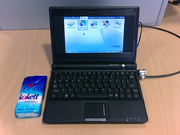|
|
By Alexander
- January 12, 2009
Shopping online can be a way to find bargains while steering clear of crowds — and sales taxes.
But those tax breaks are starting to erode. With the recession pummeling states' budgets, their governments increasingly want to fill the gaps by collecting taxes on Internet sales, which are growing even as the economy shudders.
And that is sparking conflict with companies that do business online only and have enjoyed being able to offer sales-tax free shopping.
One of the most aggressive states, New York, is being sued by Amazon.com Inc. over a new requirement that online companies must collect taxes on shipments to New York residents, even if the companies are located elsewhere. New York's governor also wants to tax "Taxman" covers and other songs downloaded from Internet services like iTunes.
The amount of money at stake nationwide is unclear; online sales were expected to make up about 8 percent of all retail sales in 2008 and total $204 billion, according to Forrester Research. This is up from $175 billion in 2007.
Based on that 2008 figure, Forrester analyst Sucharita Mulpuru says her rough estimate is that if Web retailers had to collect taxes on all sales to consumers, it could generate $3 billion in new revenue for governments.
By Alexander
- January 12, 2009
 LAS VEGAS - Last year so-called "netbooks" crept into stores — computers that often cost less than $400, with small screens and keyboards that made them look Lilliputian next to laptops that seemed perfectly portable just months earlier.
These little computers introduced consumers to the idea that extreme portability could be combined with a low price, as long as people were willing to use the computer for getting on the Internet and not much more. Netbooks won't include a DVD drive, the fastest microprocessor or enough storage space to house endless amounts of photos and videos.
This year, because of the dismal economy and laptop buyers' increasing comfort with these miniature computers, more netbooks are headed to store shelves. Some netbooks will keep their lower-than-a-cheap-PC price, but others will cost what bigger laptops do, and include features like touch screens and metal casings as companies look to keep the category's momentum going.
At the International Consumer Electronics Show last week, Taiwan-based AsusTek Computer Inc. — which launched its $269-to-$699 Eee PC netbooks in 2007 — introduced a new one called the Eee PC Touch. It sports a nearly 9-inch touch screen that swivels or folds over so it can be used as a tablet-style PC. Asus expects the Touch to be available in March for $499 and plans to release a version with a 10-inch screen.
By Melinda
- January 10, 2009
Women tend to like smart men because they're usually more successful and better providers. But here's another reason: Their sperm is better, a new study says.
Researchers at King's College London, the University of Delaware and the University of New Mexico recently compared results from five intelligence tests given to 425 Vietnam War vets in 1985 as part of the U.S. Centers For Disease Control and Prevention's Vietnam Experience Study. These vets, aged 31 to 44, also provided sperm samples, so the researchers analyzed the sperm per milliliter of semen, plus how many of the sperm swam normally, and other measures of sperm health.
The smarter the men were, the more sperm they produced and the better their wee ones swam - and it didn't matter how old the men were or whether they smoked, drank or were obese.
But why might these two seemingly unrelated traits be linked? Why would calculus aces or business consultants make better sperm?
By Melinda
- January 10, 2009
 sweat off his face during training ahead of the Sydney International …
It's not hard to tell when a guy is "happy to see you."
The twinkle in his eye, his swagger, that sexy smile - all are clear signs he's in the mood.
And, at least subconsciously, a woman can also tell by the scent of his sweat, according to new research.
Scientists have long debated whether humans, like animals, use chemical signals called pheromones to communicate sexual interest to potential mates. Problem is, the effects of pheromones are thought to be subconscious - meaning that if we do communicate using them, we sure don't know it. It's also hard to know what these pheromones might be and how we sense them, so researchers understand little about them.
But if human pheromones are going to be anywhere, they're going to be in sweat, right? Denise Chen, a psychologist at Rice University in Houston, and her colleagues devised an experiment to compare how women respond to different forms of male sweat - sweat produced in everyday situations versus that produced when a man is turned on.
The researchers speculated that if humans do produce and respond to sweat pheromones, then a woman should respond to a guy's sexual sweat differently than she does to his normal sweat.
Chen and her colleagues asked 20 heterosexual guys to stop wearing deodorant and scented products for a few days. Then they told the men to put small pads in their armpits as they watched pornographic videos and became aroused (the researchers confirmed, using electrodes, that the images did the job). Later, the guys were asked to exchange those pads for fresh pads to collect the sweat they produced when they weren't aroused.
By Alexander
- January 08, 2009
 Physical activity has many proven benefits.
It strengthens bones and muscles, improves mental health and mood, lowers blood pressure, improves cholesterol levels and reduces the risk of cardiovascular disease, diabetes, breast cancer and colon cancer. Exercise is also good for your brain.
It may not be a cure-all for obesity, however.
Though better nutrition coupled with exercise has long been the favored prescription for losing weight and avoiding obesity, a new study suggests diet actually plays the key role.
Researchers from Loyola University Health System and other centers compared African American women in metropolitan Chicago with women in rural Nigeria. On average, the Chicago women weighed 184 pounds and the Nigerian women weighed 127 pounds.
Researchers had expected to find that the slimmer Nigerian women would be more physically active. To their surprise, they found no significant difference between the two groups in the amount of calories burned during physical activity.
|
|
|
|
|
|  |
|

 We recommend
We recommend



 LAS VEGAS - Last year so-called "netbooks" crept into stores — computers that often cost less than $400, with small screens and keyboards that made them look Lilliputian next to laptops that seemed perfectly portable just months earlier.
LAS VEGAS - Last year so-called "netbooks" crept into stores — computers that often cost less than $400, with small screens and keyboards that made them look Lilliputian next to laptops that seemed perfectly portable just months earlier. sweat off his face during training ahead of the Sydney International …
sweat off his face during training ahead of the Sydney International … Physical activity has many proven benefits.
Physical activity has many proven benefits.